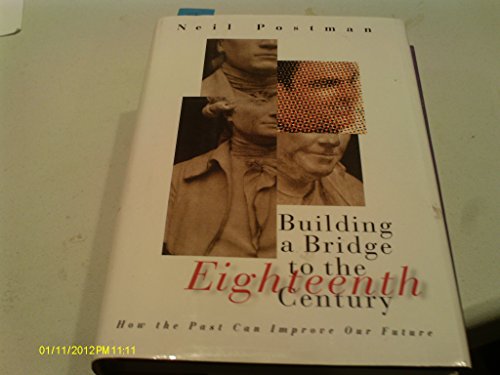
Sinossi
Explores the key humane ideas that emerged out of 18th-century philosophy and science to analyze their relevance to the modern world
Le informazioni nella sezione "Riassunto" possono far riferimento a edizioni diverse di questo titolo.
Informazioni sull?autore
Neil Postman is University Professor, Paulette Goddard Chair of Media Ecology, and Chair of the Department of Culture and Communication at New York University. Among his twenty books are <b>Amusing Ourselves to Death</b> and <b>Technopoly</b>. He lives in New York City.
Dal risvolto di copertina interno
en we are reexamining our values, reeling from the pace of change, witnessing the clash between good instincts and "pragmatism," dealing with the angst of a new millennium, Neil Postman, one of our most distinguished observers of contemporary society, provides for us a source of guidance and inspiration. In <b>Building a Bridge to the Eighteenth Century</b> he revisits the Enlightenment, that great flowering of ideas that provided a humane direction for the future -- ideas that formed our nation and that we would do well to embrace anew.<br><br>He turns our attention to Goethe, Voltaire, Rousseau, Diderot, Kant, Edward Gibbon, Adam Smith, Thomas Paine, Jefferson, and Franklin, and to their then-radical thinking about inductive science, religious and political freedom, popular education, rational commerce, the nation-state, progress, and happiness.<br><br>Postman calls for a future connected to traditions that provide sane authority and meaningful purpose -- as opposed to an
Le informazioni nella sezione "Su questo libro" possono far riferimento a edizioni diverse di questo titolo.
Altre edizioni note dello stesso titolo
Risultati della ricerca per Building a Bridge to the 18th Century: How the Past...
Building a Bridge to the 18th Century: How the Past Can Improve Our Future
Da: Zoom Books East, Glendale Heights, IL, U.S.A.
Condizione: acceptable. Book is in acceptable condition and shows signs of wear. Book may also include underlining highlighting. The book can also include "From the library of" labels. May not contain miscellaneous items toys, dvds, etc. . We offer 100% money back guarantee and 24 7 customer service. Codice articolo ZEV.0375401296.A
Compra usato
Quantità: 2 disponibili
Building a Bridge to the 18th Century: How the Past Can Improve Our Future
Da: Greenworld Books, Arlington, TX, U.S.A.
Condizione: good. Fast Free Shipping â" Good condition book with a firm cover and clean, readable pages. Shows normal use, including some light wear or limited notes highlighting, yet remains a dependable copy overall. Supplemental items like CDs or access codes may not be included. Codice articolo GWV.0375401296.G
Compra usato
Quantità: 1 disponibili
Building a Bridge to the 18th Century: How the Past Can Improve Our Future
Da: Jenson Books Inc, Logan, UT, U.S.A.
hardcover. Condizione: Acceptable. The item is showing use from the previous owner but works perfectly. Signs of previous ownership which could include: tears, scuffing, notes, excessive highlighting, gift inscriptions, slight water damage, a missing dust jacket, and library markings. Codice articolo 4BQGBJ011USI
Compra usato
Quantità: 1 disponibili
Building a Bridge to the 18th Century: How the Past Can Improve Our Future
Da: ThriftBooks-Atlanta, AUSTELL, GA, U.S.A.
Hardcover. Condizione: Good. No Jacket. Pages can have notes/highlighting. Spine may show signs of wear. ~ ThriftBooks: Read More, Spend Less. Codice articolo G0375401296I3N00
Compra usato
Quantità: 1 disponibili
Building a Bridge to the 18th Century: How the Past Can Improve Our Future
Da: ThriftBooks-Dallas, Dallas, TX, U.S.A.
Hardcover. Condizione: Good. No Jacket. Pages can have notes/highlighting. Spine may show signs of wear. ~ ThriftBooks: Read More, Spend Less. Codice articolo G0375401296I3N00
Compra usato
Quantità: 1 disponibili
Building a Bridge to the 18th Century: How the Past Can Improve Our Future
Da: ThriftBooks-Dallas, Dallas, TX, U.S.A.
Hardcover. Condizione: Very Good. No Jacket. May have limited writing in cover pages. Pages are unmarked. ~ ThriftBooks: Read More, Spend Less. Codice articolo G0375401296I4N00
Compra usato
Quantità: 1 disponibili
Building a Bridge to the 18th Century: How the Past Can Improve Our Future
Da: ThriftBooks-Atlanta, AUSTELL, GA, U.S.A.
Hardcover. Condizione: Very Good. No Jacket. May have limited writing in cover pages. Pages are unmarked. ~ ThriftBooks: Read More, Spend Less. Codice articolo G0375401296I4N00
Compra usato
Quantità: 1 disponibili
Building a Bridge to the 18th Century: How the Past Can Improve Our Future
Da: ThriftBooks-Atlanta, AUSTELL, GA, U.S.A.
Hardcover. Condizione: Fair. No Jacket. Readable copy. Pages may have considerable notes/highlighting. ~ ThriftBooks: Read More, Spend Less. Codice articolo G0375401296I5N00
Compra usato
Quantità: 1 disponibili
Building a Bridge to the Eighteenth Century : How the Past Can Improve Our Future
Da: Better World Books, Mishawaka, IN, U.S.A.
Condizione: Good. 1st. Former library book; may include library markings. Used book that is in clean, average condition without any missing pages. Codice articolo 469537-6
Compra usato
Quantità: 2 disponibili
Building a Bridge to the Eighteenth Century : How the Past Can Improve Our Future
Da: Better World Books, Mishawaka, IN, U.S.A.
Condizione: Good. 1st. Used book that is in clean, average condition without any missing pages. Codice articolo 4083983-6
Compra usato
Quantità: 1 disponibili

